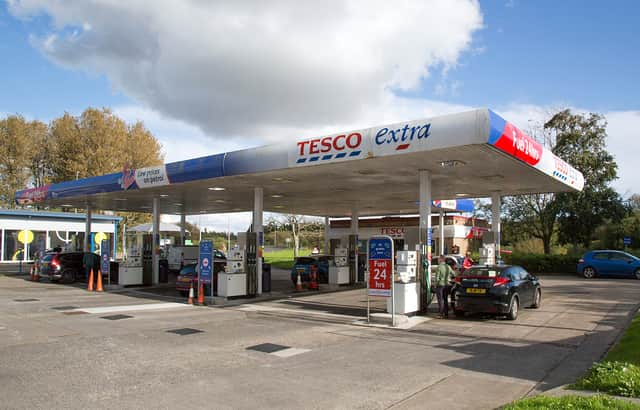Supermarket chiefs are happy to blame others for high fuel prices but less vocal about their rising profits
and live on Freeview channel 276
Senior figures from the UK’s “big four” supermarkets have told MPs they are doing all they can to help consumers in the face of rampant inflation.
That may come as a surprise to drivers who for the last year have been struggling with sky-high fuel prices and a sense that retailers aren’t playing fair with them.
Advertisement
Hide AdAdvertisement
Hide AdSenior executives from Tesco, Asda, Morrisons and Sainsbury’s were questioned by the Business and Trade Committee on their food and fuel pricing amid claims they are profiteering at consumers’ expense.
As you’d expect, they denied such claims and managed to talk a lot without saying much, trying to shift blame and focus around fuel costs onto external factors while deflecting from their own role in rising prices.
All were very happy to talk of the volatility of the market caused by the war in Ukraine, the rising costs of running their businesses and the impact of a shift towards electric cars. They were less comfortable discussing the Competition and Market Authority’s (CMA) assertion that they have virtually doubled their fuel profit margins in the last four years or explaining how this was “doing absolutely everything” to help consumers.
There’s no doubt that the war has had a massively disruptive impact on the industry, affecting supply and leading to surging wholesale costs as buyers battled over oil from sources outside of Europe and Russia. We saw this most acutely this time last year when petrol and diesel both came frighteningly close to £2 per litre as wholesale prices spiralled.
Advertisement
Hide AdAdvertisement
Hide AdIt’s also true that prices have fallen significantly since then and that energy and labour costs are making running a filling station more expensive just as drivers start to abandon fossil fuels in favour of electric power.
Tesco’s commercial director, Gordon Gafa, was also only too keen to highlight that 53% of the cost of a fill-up is fuel duty and VAT, both beyond retailers’ control and both irrelevant when it comes to their profit margins.


What none of that explains is why between 2018 and 2022 the average fuel margin across supermarkets has grown from less than 4% to almost 8% in 2022. That’s according to the CMA’s interim report which also accuses at least one supermarket of specifically targeted higher fuel margins, and notes that along with external factors, a weakening in supermarket competition has led to rising fuel prices.
At the committee none of the executives would be drawn on that alleged lack of competition, nor would they confirm or deny that they had increased their profit margins. Only Morrison’s CEO David Potts conceded that there was “a bit more profit at the retail end of fuel” than historically.
Advertisement
Hide AdAdvertisement
Hide AdThe three other representatives dodged the question by insisting they had supplied all the required information to the CMA and would await the findings of its final report. That’s somewhat at odds with the CMA’s assertion in its interim report that “we are not satisfied that they have all been sufficiently forthcoming with the evidence they have provided”.
None of them was particularly keen, either, to explain why it took until after the CMA raised concerns over diesel prices being too high for too long for them to take action on the matter.
The chains claim that they’ve been waiting for market stability before cutting prices but diesel’s wholesale price has been falling steadily and consistently for the last six months - hardly the day-by-day volatility we saw last year. Even now, diesel’s wholesale price is 2p lower than petrol but average forecourt prices are still 1p per litre more than unleaded.
That’s eight weeks since the wholesale price dipped beneath petrol’s and the change still isn’t being fully reflected. Yet forecourts are only too happy to ramp prices up the moment there’s an uptick in wholesale costs, blaming that dreaded volatility.
Advertisement
Hide AdAdvertisement
Hide AdAll of the excuses given - the impact of the Ukraine war, growing electrification, rising costs elsewhere - have some validity but still don’t explain or excuse why forecourt prices suffer this rocket and feather effect or why profit margins have grown as drivers struggle with the cost of living crisis.
The final report from the CMA will make for interesting reading, as will the supermarkets’ response but short of admitting they’ve been exploiting drivers to extend their profits it seems there’s little more they can say.
Comment Guidelines
National World encourages reader discussion on our stories. User feedback, insights and back-and-forth exchanges add a rich layer of context to reporting. Please review our Community Guidelines before commenting.
